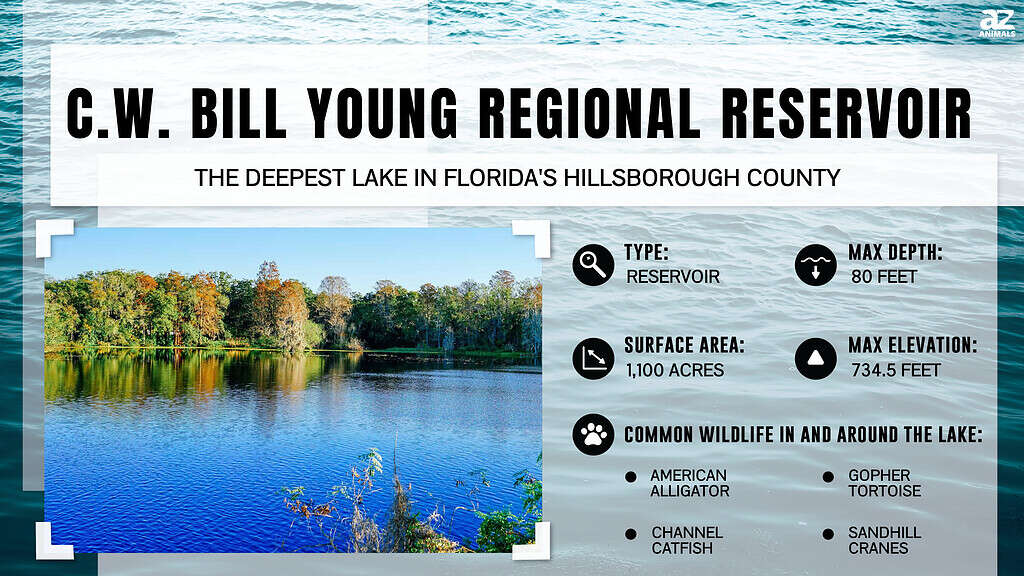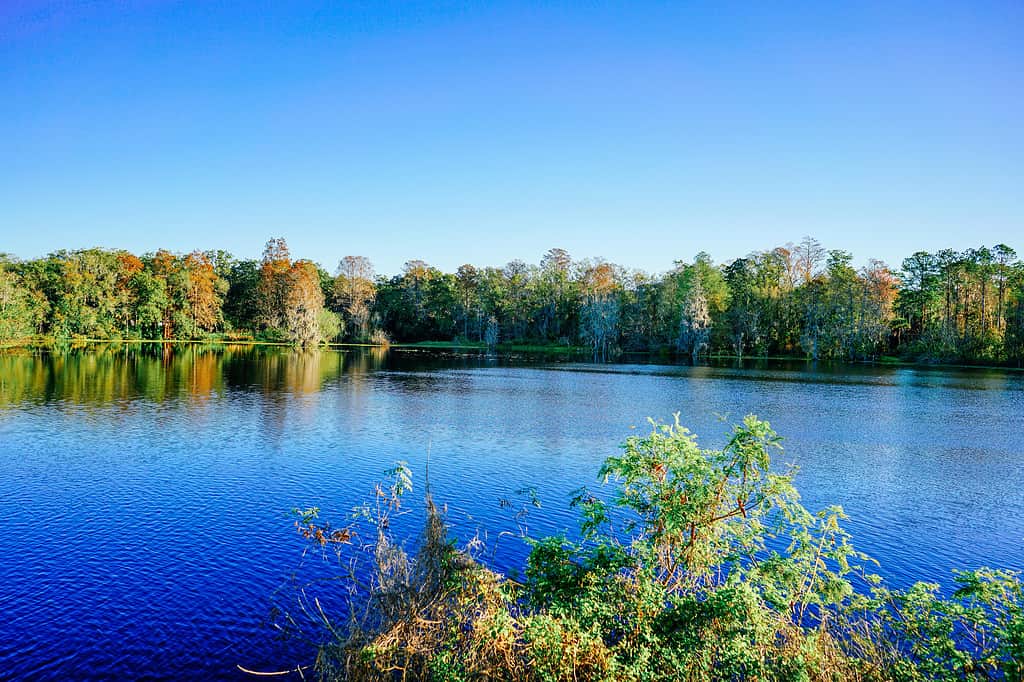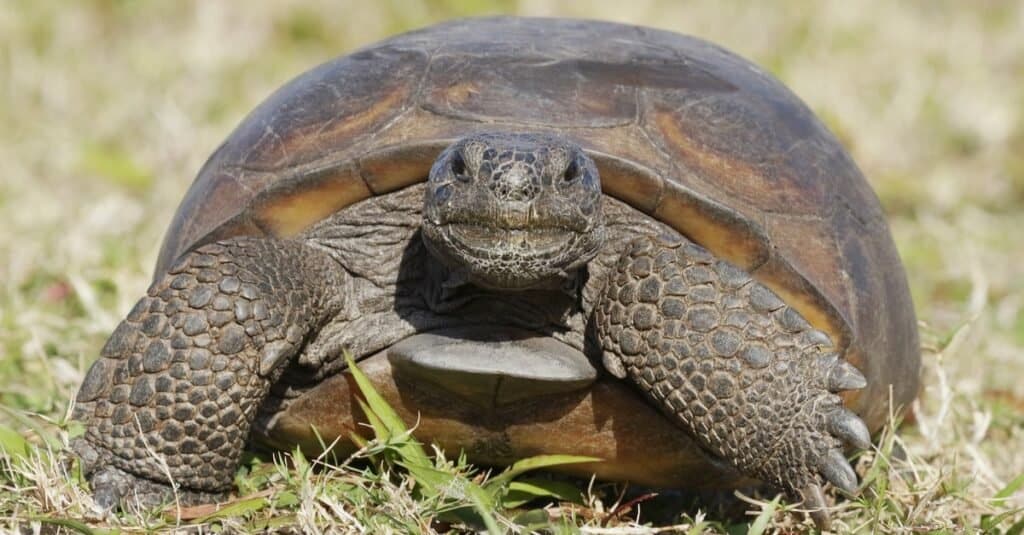
Hillsborough County is home to one of the largest natural springs in Florida and the deepest lake in the state. This county protects and celebrates natural environments and encourages outdoor recreation at state parks and reserves. It’s also the most populated county in the Tampa Bay Area.
Although it takes third place in tourist attractions (following Greater Orlando and Greater Miami), it has its own set of charms that make it worth visiting.
Discover the deepest lake in Hillsborough County, learn more about the type of wildlife that surrounds the lake, and find out what kinds of activities you can participate in if you visit!
The Deepest Lake in Hillsborough County, Florida
The deepest lake in Hillsborough County, Florida, is the C. W. Bill Young Regional Reservoir. Its depth ranges between 40 and 80 feet. The lake is situated in the southeastern portion of Hillsborough County. It holds a total of 15 billion gallons of water.
The Southwest Florida Water Management District, along with Tampa Bay Water, purchased 5,515 acres in the county in 2001 and used 1,100 acres to build the lake. The C. W. Bill Young Regional Reservoir is vital to residents. In fact, it serves as their water supply, providing a quarter of Tampa Bay’s needs for half of a year. Tampa Bay Water both owns and manages the reservoir.
The surrounding land is made up of several different habitats that include:
- Freshwater marshes
- Pine Flatwoods
- Wetlands
- Scrub
- Improved pasture
With the introduction of the C. W. Bill Young Regional Reservoir, the water supply in the area is a lot more reliable. It also makes for a more drought-resistant water supply, allowing for greater flexibility overall. During wet times, several water sources (Tampa Bypass Canal, Alafia River, and Hillsborough River) flow down to the reservoir, where the water is stored.
When it’s dry, the water stored in the reservoir is usable after it’s been treated and blended, which allows for a healthy supply for the surrounding area. Though it was built in 2001, it didn’t open until 2005. It was used for 11 years until 2012 when several cracks were discovered that required renovation.
It closed during the renovation project and opened again two years later, in 2014.

During wet times, several water sources, including the Hillsborough River, flow down to the C. W. Bill Young Regional Reservoir.
©Feng Cheng/Shutterstock.com
Wildlife Surrounding the C. W. Bill Young Regional Reservoir
Wildlife thrives in several parks and reserves around the C. W. Bill Young. Hillsborough County conserves and manages the land around the Alafia River to ensure the wildlife habitat remains available for future generations. This environment has two primary habitats, including upland hammocks and hardwood swamps. In addition, there are trails for those interested in walking through the area. Some of the animals found in the Alafia River Corridor include the eastern indigo snake, gopher tortoises, and American alligators.
Florida’socation close to the C. W. Bill Young Regional Reservoir is the Chito Branch Reserve. This natural sanctuary is home to Florida’s wildlife. Those interested in visiting can stop by to observe the different animals inhabiting the space (as well as some rare plants).
You could either enjoy the winding paths on foot or take your bicycle to enjoy the bike trails. Some of the animals you may encounter while visiting the Chito Branch Reserve include wading birds, gopher tortoises, and fox squirrels.
Edward Medard Park is in the eastern portion of Hillsborough County and is a great spot for boating, hiking, mountain biking, and fishing. Although the reservoir in the park is not as large as the C. W. Bill Young Regional Reservoir, its 700 acres are ideal for boating, fishing, and canoeing.
There is a disc golf course you can enjoy, as well as some picnic shelters, a playground, and an observation platform. Wildlife in the park includes mourning doves, green herons, sandhill cranes, bald eagles, sunshine bass, and channel catfish. Mammals and reptiles include skunks, opossums, tortoises, and snakes.

Endangered animals like the Gopher
Tortoise
(
Gopherus polyphemus) can be observed in the proximity of the C. W. Bill Young Regional Reservoir.
©Brian Lasenby/Shutterstock.com
Things to Do Around the C. W. Bill Young Regional Reservoir
Aside from checking out the natural, preserved lands surrounding the reservoir, you could head out to the Busch Gardens. There you can enjoy live music, rollercoasters, and wildlife, all in a single park.
Ride on the Cheetah Hunt, Tigris, Iron Gwazi, or the newest atyou’llon, the Serengeti Flyer. There are safaris and tours, tons of kid-friendly activities, and plenty of places for shopping and dining.
For something a little different, like a maritime history lesson, you could head out to the American Victory Ship and Museum. There, you’ll have the option to partake in a self-guided tour, or a docent-guided tour, or arrive with a group and take advantage of special pricing.
Where is C. W. (Bill) Young Regional Reservoir Located on a Map?
Named after C. W. Bill Young, the U.S. Congressman from Florida’s 10th congressional district, the C.W. Bill Young Regional Reservoir is a reservoir in central Florida. It has a capacity of 15.5 billion US gallons and serves as a collection point for water from the Alafia and Hillsborough Rivers.
Here is C. W. Bill Young Regional Reservoir on a map:
The photo featured at the top of this post is ©
Thank you for reading! Have some feedback for us? Contact the AZ Animals editorial team.






